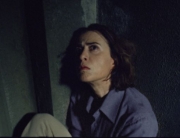A wildcat, according to Merriam-Webster, is a “savage, quick-tempered person.” Despite her meek, unprepossessing appearance, Flannery O’Connor (1925-1964) wielded her scathing, violent humor as a literary weapon to create some of the most original fiction in American literature.
In an early scene in director Ethan Hawke’s muddled film about the Southern writer, a New York publisher (Alessandro Nivola) tells the aspiring author (played by a prickly Maya Hawke), “Sometimes I think you’re trying to stick pins in your readers.” O’Connor’s anxious, overprotective mother Regina (Laura Linney) and Aunt Duchess (a warmhearted Christine Dye) also don’t understand her stories. The women wonder why O’Connor can’t write like that other Georgia writer, Margaret Mitchell. O’Connor’s new story “left a bad taste in my mouth,” says Duchess. “You weren’t supposed to eat it,” the young writer tartly replies.
The film’s title also refers to an O’Connor short story about a protagonist struggling with his impending death. After several years away studying with poet Robert (“Cal”) Lowell (Philip Ettinger) at the University of Iowa, and living in New York City where she was drafting her first novel Wise Blood, an ailing O’Connor reluctantly returns home to her mother’s farm in Georgia. There her aunt reveals that O’Connor has lupus, not arthritis as her mother told her. This is the same fatal disease that killed O’Connor’s father. Suddenly the reality of death has come upon the writer. “I don’t need a doctor. I need a priest,” O’Connor notes to her mother.
When the priest eventually shows up at O’Connor’s bedside, he is played by Liam Neeson (in an uncredited cameo) in the movie’s biggest casting misfire. Neeson’s distracting presence (Is he going to demonstrate the particular set of skills that he developed in the “Taken” action series?) undercuts the power of the scene in which an agonized O’Connor begs God for grace.
Working with co-screenwriter Shelby Gaines (who also composed the bluesy score with brother Latham), the director draws upon the author’s words—her short stories, letters, and even her posthumously published Prayer Journal—to create a portrait that swings back and forth in style from traditional biopic to a visualized anthology that brings some of her most famous stories (“A Good Man is Hard to Find,” “Revelation,” “Good Country People”) to life.
Unfortunately, the decision to cast Hawke and Linney as the leads in those stories may give viewers the mistaken impression that O’Connor wrote these works to get back at her overbearing mother. And audience members unfamiliar with the author’s work will be confused and bored by these embedded narratives, starting with the opening black-and-white “prevue” trailer.
The blue and green tones of Steve Cosens’s pallid cinematography may subconsciously be trying to capture the colors of O’Connor’s famous peacocks, but the chilly result may have some viewers wishing to stuff newspapers into their coats as O’Connor does for her train trip back to Georgia. Sarah Young’s set design relies too much on cinematic publishing clichés: luxurious, dark wood-paneled offices with roaring fireplaces. Have production designers ever visited an actual publishing company?
A labor of love on the part of the Hawkes, Wildcat may have some appeal for Flannery O’Connor admirers, who will be inspired to reread her stories. But the award-winning documentary Flannery offers more insights into the author’s less-attractive traits (racism). And John Huston’s 1979 adaptation of Wise Blood evokes O’Connor’s grotesque spiritual vision with an authenticity that this film lacks.







Leave A Comment